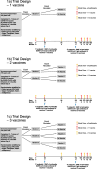Bringing optimised COVID-19 vaccine schedules to immunocompromised populations (BOOST-IC): study protocol for an adaptive randomised controlled clinical trial
- PMID: 39020446
- PMCID: PMC11253462
- DOI: 10.1186/s13063-024-08315-2
Bringing optimised COVID-19 vaccine schedules to immunocompromised populations (BOOST-IC): study protocol for an adaptive randomised controlled clinical trial
Abstract
Background: Immunocompromised hosts (ICH) experience more breakthrough infections and worse clinical outcomes following infection with COVID-19 than immunocompetent people. Prophylactic monoclonal antibody therapies can be challenging to access, and escape variants emerge rapidly. Immunity conferred through vaccination remains a central prevention strategy for COVID-19. COVID-19 vaccines do not elicit optimal immunity in ICH but boosting, through additional doses of vaccine improves humoral and cellular immune responses. This trial aims to assess the immunogenicity and safety of different COVID-19 vaccine booster strategies against SARS-CoV-2 for ICH in Australia.
Methods: Bringing optimised COVID-19 vaccine schedules to immunocompromised populations (BOOST-IC) is an adaptive randomised trial of one or two additional doses of COVID-19 vaccines 3 months apart in people living with HIV, solid organ transplant (SOT) recipients, or those who have haematological malignancies (chronic lymphocytic leukaemia, non-Hodgkin lymphoma or multiple myeloma). Key eligibility criteria include having received 3 to 7 doses of Australian Therapeutic Goods Administration (TGA)-approved COVID-19 vaccines at least 3 months earlier, and having not received SARS-CoV-2-specific monoclonal antibodies in the 3 months prior to receiving the study vaccine. The primary outcome is the geometric mean concentration of anti-spike SARS-CoV-2 immunoglobulin G (IgG) 28 days after the final dose of the study vaccine. Key secondary outcomes include anti-spike SARS-CoV-2 IgG titres and the proportion of people seroconverting 6 and 12 months after study vaccines, local and systemic reactions in the 7 days after vaccination, adverse events of special interest, COVID-19 infection, mortality and quality of life.
Discussion: This study will enhance the understanding of COVID-19 vaccine responses in ICH, and enable the development of safe, and optimised vaccine schedules in people with HIV, SOT, or haematological malignancy.
Trial registration: ClinicalTrials.gov NCT05556720. Registered on 23rd August 2022.
Keywords: COVID-19; Chronic lymphocytic leukaemia; HIV; Immunisation; Multiple myeloma; Non-Hodgkin lymphoma; RCT; Solid organ transplantation; mRNA vaccine.
© 2024. The Author(s).
Conflict of interest statement
The authors declare that they have no competing interests.
Figures
References
-
- Bhaskaran K, Rentsch CT, MacKenna B, Schultze A, Mehrkar A, Bates CJ, et al. HIV infection and COVID-19 death: a population-based cohort analysis of UK primary care data and linked national death registrations within the OpenSAFELY platform. Lancet HIV. 2021;8(1):e24–e32. doi: 10.1016/S2352-3018(20)30305-2. - DOI - PMC - PubMed
-
- Yamanaga S, Shimata K, Ohfuji S, Yoshikawa M, Natori Y, Hibi T, Yuzawa K, Egawa H. Japan Society for Transplantation COVID-19 Registry Study Group. Excess mortality in COVID-19-affected solid organ transplant recipients across the pandemic. Am J Transplant[Internet]. 2024. [Cited 2024 April 10]. Available from: https://www.amjtransplant.org/article/S1600-6135(24)00212-0/fulltext. 10.1016/j.ajt.2024.03.016. Epub ahead of print. - PubMed
Publication types
MeSH terms
Substances
Associated data
Grants and funding
LinkOut - more resources
Full Text Sources
Medical
Miscellaneous


